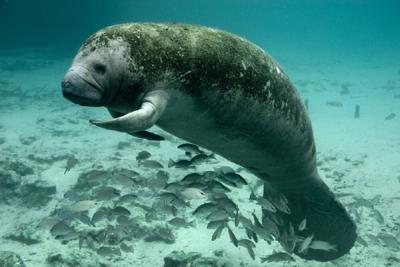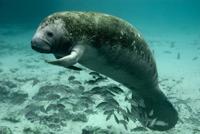
The Florida manatee is among the threatened species facing potential harm from offshore oil drilling, according to a new legal claim.
The Trump administration has failed to comply with the Endangered Species Act during its review of the physical harm marine mammals face from ongoing offshore oil and gas activities in the Gulf of Mexico, a new legal claim states.
The Center for Biological Diversity, a national environmental group, filed the new legal challenge on July 21 as an update of a 2024 federal lawsuit. The latest amended complaint criticizes recent U.S. Fish and Wildlife Service assessments of potential harm that oil spills, vessel collisions, noise and light pollution, and habitat degradation can do to threatened species such as sea turtles, West Indian manatees, beach mice, whooping cranes, piping plovers and other birds.
Energy industry activities in the gulf involving 2,070 active offshore leases encompassing 11.3 million acres can cause multiple threats to endangered species, according to the complaint. But the FWS assessments of such threats in reports drawn up this year and in 2018 conclude that the harm to these species resulting from energy extraction would be “extremely low, but not zero.”
“... The 2018 Biological Opinion fails to adequately address numerous threats of Gulf oil and gas drilling activities, including the risks and impacts of large, very large and extremely large oil spills; bird collisions with vessels and offshore platforms; manatee collisions with vessels; light pollution; and the degradation and destruction of habitat for the Gulf’s imperiled species,” the complaint says.
The 2018 opinion acknowledges that an oil spill greater than 10,000 barrels, or 420,000 gallons, is likely to take place, but it concluded that the approval of extensive oil and gas drilling would not impair any species or critical habitat. Such a spill would not cause the death of even one endangered or threatened species, according to the opinion.
The center asks the federal district court in the District of Columbia to declare both the 2018 opinion and the 2025 consultation report supporting the earlier report arbitrary and capricious and to vacate them.
The FWS did not respond to a request for comment on the new filing, but one of the center’s attorneys, Kristen Monsell, said the number of animals threatened by a 10,000-barrel oil spill depends on multiple factors, such as location and trajectory. But the wildlife service failed to use modeling techniques to determine the realistic impact of such a spill, Monsell said.
“Instead, the agency simply dismissed any impacts from oil spills as unlikely, flouting its legal obligations in the process,” she told the Florida Record in an email. “Compounding the problem is that 420,000 gallons is a significant underestimate. The National Marine Fisheries Service recently determined, for example, that a spill of 4.2 million gallons is likely to occur from offshore drilling – the very same activities FWS considered in its analysis. It’s yet another reason why FWS’s analyses are unreasonable and unlawful.”
The new legal filing indicates that many of the center’s members, including an avid bird watcher who has traveled to Louisiana to see coastal and ocean birds and a Florida resident who regularly photographs manatees in their habitat, face injuries to their enjoyment of coastal waters due to potential species harm resulting from offshore drilling.
The center also filed another lawsuit in May that challenged an opinion by the National Marine Fisheries Services that examined the impact of Gulf oil and gas activities on Rice’s whales, endangered sperm whales and corals.
“Federal officials have forgotten the lessons of the (2010) Deepwater Horizon disaster, because they’ve missed obvious threats to some of the Gulf’s most vulnerable critters,” Monsell said. “... Our government is required to protect manatees and sea turtles and other threatened animals Americans adore. Officials need to redo these assessments with a much larger dose of reality and much less deference to oil and gas interests.”






